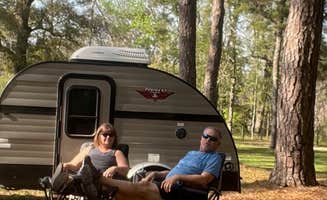Tent campsites near Apalachicola, Florida are predominantly located within the Apalachicola National Forest, the largest national forest in Florida covering over 632,000 acres. The terrain features primarily flat, sandy soil with longleaf pine and wiregrass ecosystems. Winter temperatures typically remain above freezing, with January lows averaging around 40°F, making cold-weather camping generally accessible without specialized equipment.
What to do
Paddling access points: Camp Mack provides direct river access with a boat launch adjacent to its camping area. According to Jacob F., "Only seven camp sites all of them next to one another. River runs along the border of the camp there is a boat launch."
Hunting opportunities: The Apalachicola Forest region includes several hunt camps supporting seasonal hunters. Harpers Hunt Camp is located approximately 10 miles east of Highway 65 on Forest Road 22, though campers should note Kelly H.'s warning that "The photos for the camp site are nothing like how it is. Very misleading."
River fishing: Whitehead Landing NF Campground offers both camping and fishing access on the river. John P. noted, "There's a nice little boat ramp on the river," making this a practical base for anglers seeking freshwater species.
What campers like
Low camping fees: Forest service campgrounds in this region typically charge minimal fees. At Whitehead Landing, Zack W. reports, "At only $3/night, you can't beat the peace and quiet! These campsites include a metal fire ring and picnic tables."
Natural water sources: White Oak Landing Campground offers a unique water feature appreciated by visitors. Jacob A. shared, "This site also has a everflowing water supply that has been there for decades. It's sulfer water but it's clean and cold."
Off-season solitude: The camping areas provide significant privacy during non-peak periods. At Cotton Landing, Katlyn A. found "Very peaceful during slow time of the year" and noted "people I met there were great, no drama and bathrooms were decent."
What you should know
Wildlife and insects: Tick populations can be significant in wooded areas throughout the region. As Katlyn A. advises about Cotton Landing, "Ticks are definitely out at this campsite but only in the woods so get fire wood along the dirt road on your way in to avoid the ticks and sticker bushes."
Facility limitations: Most forest service campgrounds offer basic facilities only. At Whitehead Landing, despite having pit toilets, campers report: "Most of the fire rings seem to double as garbage cans by other campers as they are leaving, despite the nearby receptacles. So expect to pick up someone else's trash before you can build a fire."
Cell coverage varies: Connectivity can be unpredictable throughout the national forest. John P. reports at Whitehead Landing, "Decent Verizon signal, no T-Mobile," information crucial for those needing to maintain communication while camping.
Tips for camping with families
Safety considerations: The remote nature of these campsites requires preparation. At Camp Mack, a reviewer noted feeling secure despite the isolation: "Small campground in National Forest. 10 sites. Very quiet. We felt very safe."
Spacing between sites: Camp Mack provides compact camping with limited separation between sites. Jacob F. describes it as "Small but quiet" with "Only seven camp sites all of them next to one another," making it important to consider proximity to other campers when visiting with children.
Facilities assessment: Basic toilet facilities at forest service campgrounds vary in maintenance. Zack W. reports Whitehead Landing has "a pit toilet that is surprisingly clean, trash receptacles, and water spigots," though water is non-potable at most locations.
Tips from RVers
Beach proximity options: For RVers seeking coastal access, alternatives exist beyond the forest. At El Governor Motel & RV Park, Brian notes it's "literally across the road from the beach" though campers should be aware "Gravel lots close to your neighbors and a little pricey but you are paying for location."
Cleanliness standards: Maintained RV parks offer more amenities than forest service campgrounds. Lori P. shares that at El Governor, "The bath house and laundry room is always spotless" and "You can walk across the street to the beach."
Site spacing challenges: RV parks typically feature closer site spacing than primitive camping areas. Christine observed at El Governor simply "Not much privacy," an important consideration for those accustomed to more spacious forest camping.


